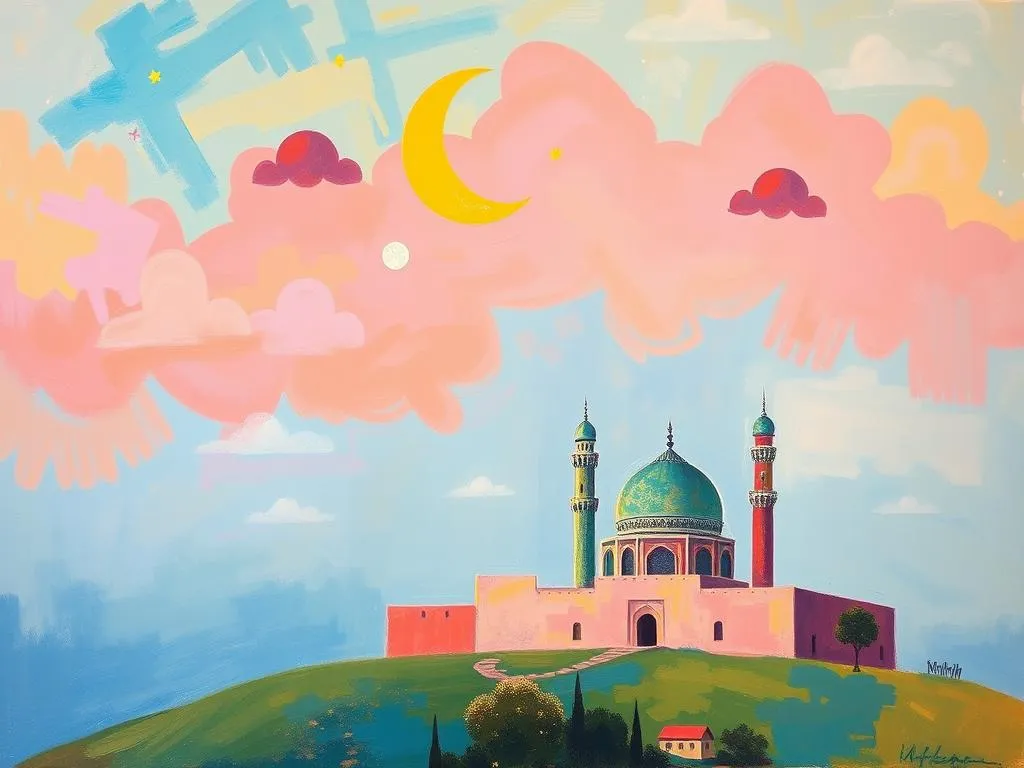
Dreams have always fascinated humanity, serving as windows into our subconscious, reflecting our thoughts, emotions, and experiences. Among the myriad of dream themes, dreams featuring Muslim countries—whether through landscapes, cultural symbols, or religious elements—carry unique significance. These dreams often provoke deep curiosity and introspection, prompting individuals to explore their connections to faith, identity, and cultural understanding. In this article, we will delve into the symbolism and meaning behind such dreams, examine various dream scenarios, and provide insights on how they relate to our waking lives.
Symbolism and Meaning
Dreaming of a Muslim country can embody a diverse range of symbols, each resonating with different meanings depending on the context of the dream and the dreamer’s personal experiences. First and foremost, such dreams often signify a quest for spirituality or a deeper understanding of one’s faith. They might emerge during times of transition or uncertainty, suggesting a need for guidance or clarity. The presence of mosques, prayer beads, or even the call to prayer can evoke feelings of devotion or a desire for connection to a higher power.
Another significant symbol is the cultural landscape. Dreaming of bustling markets, serene deserts, or historical landmarks can reflect the dreamer’s appreciation for diversity and the richness of different cultures. These images might indicate a longing to explore or engage with a world beyond one’s immediate environment, highlighting a quest for global understanding or a broader perspective on life.
Moreover, the people encountered in these dreams can play a crucial role in interpretation. Interaction with locals may symbolize a desire for connection or communication with aspects of oneself that are influenced by cultural or religious values. It can also suggest an exploration of one’s identity and beliefs, especially if the dreamer has a personal connection to Muslim culture or communities.
In a broader context, dreams featuring Muslim countries may reflect current events or personal experiences related to cultural or religious discussions. The dream may serve as a means of processing feelings about diversity, acceptance, or even conflict. By recognizing these elements, dreamers can gain insights into their emotions and perspectives regarding multiculturalism and tolerance.
Key Scenarios and Variations
The interpretation of dreams involving Muslim countries can vary significantly based on specific scenarios and settings. For instance, dreaming of traveling through a vibrant bazaar filled with spices and textiles can symbolize an exploration of one’s sensory experiences or a desire for adventure. It represents the richness of life and may indicate an upcoming opportunity for personal growth or exploration of new ideas.
Conversely, dreaming of being lost in a vast desert may evoke feelings of isolation or confusion. This scenario could reflect the dreamer’s current emotional state, suggesting a need for direction or support in navigating life’s challenges. The desert’s emptiness may symbolize a feeling of being spiritually adrift or disconnected from one’s purpose.
Another common scenario involves participating in a religious ceremony or gathering. Such dreams could signify a longing for community or a deeper connection to one’s faith. They may also reflect feelings of belonging, acceptance, or a desire to explore one’s spiritual roots. The emotions felt during these dreams—whether joy, peace, or anxiety—can provide further insight into the dreamer’s current spiritual journey.
On the other hand, dreams that involve conflict or tension in a Muslim country can indicate internal struggles. These dreams might manifest feelings of fear, misunderstanding, or even guilt related to cultural or religious differences. They often serve as a call for self-reflection, encouraging the dreamer to confront these emotions and seek resolution or understanding.
Ultimately, the variation in scenarios underscores the multifaceted nature of dreams. Each dream provides a unique lens through which the dreamer can examine their thoughts, feelings, and experiences related to culture, identity, and spirituality.
Real-Life Connections and Takeaways
Understanding the symbolism inherent in dreams about Muslim countries can offer valuable insights into our real-life situations. For those who experience such dreams, it’s essential to engage in self-reflection to uncover personal meanings and implications. Start by asking yourself what elements of the dream resonated most with you. Were there specific symbols or emotions that stood out? Reflecting on these can guide you in drawing connections to your waking life.
Consider how these dreams might relate to your experiences with cultural diversity. Are there aspects of different cultures that you admire or wish to understand better? Engaging with various cultures—through travel, reading, or community events—can enrich your life and foster a deeper appreciation for global perspectives. If you feel drawn to the spiritual aspects of your dream, it may be worthwhile to explore your own beliefs and practices, seeking ways to strengthen your connection to faith or community.
Additionally, if your dream involved feelings of conflict or misunderstanding, it may be beneficial to examine your own perspectives on cultural or religious differences. Striving for empathy and understanding can lead to personal growth and improved relationships with others. It is crucial to approach these reflections with an open heart and mind, allowing for deeper understanding and compassion.
Finally, keep in mind that dreams serve as a mirror to our subconscious. They can reveal our fears, desires, and unresolved issues. By acknowledging and exploring these elements, dreamers can embark on journeys of self-discovery and healing. Whether it’s through journaling, art, or conversation, expressing these insights can empower you to navigate your waking life with newfound clarity and purpose.
In conclusion, dreams featuring Muslim countries are rich with symbolism and meaning, reflecting personal beliefs, cultural appreciation, and emotional landscapes. By understanding the nuances of these dreams, individuals can gain insights into their identities, relationships, and spiritual journeys. As you explore your dreams, remember to approach them with curiosity and openness, allowing for deeper understanding of yourself and the world around you.







